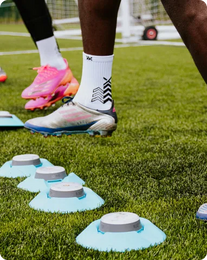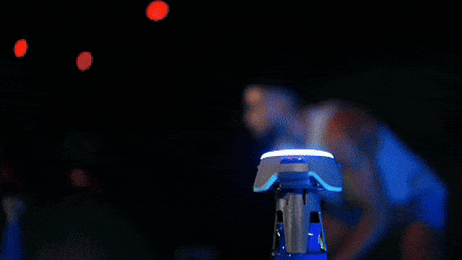With the EURO 2024 quickly approaching, the heat is on, but injuries don't have to be. As the competition intensifies, so does the risk of injury. On the global stage, soccer players face an average of 14 injuries per 1000 hours of playing time; enough to make any coach’s heart skip a beat.

However, just because injury possibility rates are high, does not mean they are certain. Studies have shown that training situational awareness, building confidence, and improving a player's ability to ‘react intelligently’ can prevent injuries in soccer. Through cognitive training, rather than screaming at players from the sidelines to “anticipate” or “focus,” coaches can instill actual skills into players to perform, without dreading any chance of strains, sprains, or pains.
Here’s why using BlazePod’s technology to improve Reactive Intelligence is how to avoid injuries in soccer:
Improve Reaction Time Game
Injuries happen, and for coaches, clubs, and players alike; it is the worst-case scenario. However, the best way to prevent soccer injuries is to reduce the threat of it. By training footballers' reaction time—and even more importantly, their Reactive Intelligence—players can recognize, prepare, and remove the danger before it is too late.
Coaches can’t train their players to improve their reflexes; it is impossible to train our reflexes at all. However, what can be taught is how to turn our reactions into reflexive behavior. When we accidentally touch a boiling stovetop or oven, we naturally recoil from the heat. This is an involuntary reaction to something, and happens so naturally and quickly that your body reacts before we have time to communicate the pain to our brains.
If we can train our Reactive Intelligence to act in the same way as a reflex and sense danger before it occurs, injuries in soccer are a more distant possibility. Through simulated training that challenges them cognitively and physically all at once, football players can prepare for any situation, plan their response, and prevent an injury. BlazePod’s Reactive Intelligence methodology allows footballers to train the cognitive off-the-pitch, making them more precise, efficient players on-the-pitch. Create team or individual drills that are fun, engaging and stir up competition within the team with in-app Leaderboard and Benchmark features. When training feels like a game, players will never miss a session.
Learn How to Manage Stress
When we experience stress for long periods with no break, the decision-making part of our brain becomes compromised. The left side of the brain helps with logic and rationality, while the right side accounts for creativity and imagination. These two halves may operate different behavioral functions but, in order for our brain to function properly, they must work in tandem. Footballers in particular need to actively use both sides to perform at their best. To be effective, logical decisions, like where to direct the ball, require intuition and creative thinking, like tricking the opposition with a deceptive trick.
If players undergo lengthy periods of stress, the left and right hemispheres of the brain cease to communicate, and making the right gameplay decisions becomes more difficult. Under extreme pressure during a highly competitive sport, players may resort to less-than-safe moves to execute their goals; leading to common injuries in soccer players that oftentimes could have been avoided. As such, stress management training is one of the most crucial and neglected aspects of football coaching.
By training cognitive exercises in conjunction with physical exercises that improve form, footballers can use simulated gameplay drills to prepare for any outcome, stay calm, and prevent soccer injuries.
BlazePod has 40+ football specific drills that guide players in how to turn high-pressure and intense competition into their greatest asset. Learning to perceive, process, and react faster and without doubt is essential in building confidence, keeping cool, and staying in shape for the rest of the season. Equipping players with the skills and practice for any situation through simulated gameplay that is fun, active and challenging, footballers are prepared for any obstacle on the pitch.
Put Your Brain in a Better Headspace
A study completed on the effects of headspace on injury showed that anxiety, depressive thoughts and daily stresses were the three highest contributors to sport-related injuries. Considering injuries in soccer account for 19% of all professional sports injuries; footballers arguably struggle with a more scrambled mindset than most athletes.
Beyond staying engaged in gameplay and maintaining attention, what separates good footballers from great ones is the ability to control their mindset. How and where players focus their attention greatly impacts their gameplay, and lapses in confidence make players doubt their abilities. Not only is there evidence to suggest that decreased confidence leads to decreased performance, but there is also proof that it can be a major contributor to injuries.
‘Switching off’ negative thoughts and internal doubt prevents players from acting impulsively and potentially injuring themselves. If players can quiet noisy doubts and redirect their focus to performing their role, the chances of injury are strikingly lower.
While confidence is difficult to teach, cognitive enhancement training can be easily integrated into any team or individual practice. This is particularly relevant for players with previous injuries who are concerned about reversing their rehabilitation and progress. Footballers may act more reluctantly to prevent worsening their impairment, rather than executing plays that would benefit themselves and the team.
By engaging in training to improve their Reactive Intelligence, rather than constant and purely physical training that can tire and demotivate players, coaches can improve players’ general ability to focus. This makes them more mindful, aware of their surroundings and, consequently, more assured in their competency. BlazePod’s light training technology prepares players for challenges on the pitch by imitating real-life plays and lets them compare their reaction time against themselves and even their teammates. Bring your headspace up, let injuries in soccer statistics naturally drop.
Conclusion
Legendary Dutch player Johan Cruyff once said, “Soccer is a sport that you play with your brain.” If players can improve their Reactive Intelligence, it is possible to quicken their reaction time, learn to pacify stress, refocus and adapt their mindset. Having a stronger Reactive Intelligence can mean the difference between a career-ending injury and performing at their best all season long. When you are next training with endless laps or shooting drills, remember there’s more than one way to train, and exercising your brain may be the place to start.






















